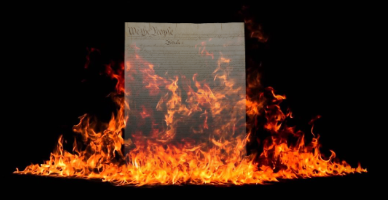
Every democracy that changes its rules is an experiment; each democracy that differs from the others is an experiment.
All democracies are the laboratories of democracy.
And the United States has failed to learn from them.
Mostly, that’s just age: the U.S. is old for a democratic State, and that makes it hard for it to change and adopt new and better ways to do things.
It’s also partly optimism: when the U.S. constitution was written, it was a new beginning and it didn’t occur to them that the system they were building would at some point become the old system that itself needed to be replaced.
So they didn’t include any way to to do that.
Sure, they put in some mechanisms for incremental change and one mechanism to trigger a full re-modeling of the State. Credit where it’s due, they tried.
But because they thought of the State as being the province of only people like themselves (though not outright, of course) the mechanisms they included can only be triggered by that part of the people that is already in power.
The system they thought would stand as a beacon for the ages lasted 250 years with only one major stress-test before it collapsed.
That’s not nothing, and they deserve to be honored for what the system achieved.
But frankly, that system has finally failed.
The system of tuned balances of power that they built so carefully has collapsed, and all the powers of the State are effectively in the hands of one man and his small group of dedicated followers.
Without a strong and honorable Congress to check the President’s excesses, and without a detached Supreme Court to maintain the rule of law, their system cannot function.
It turns out that depending on the people who run the State to check each other without some mechanism to guarantee that their interests are not aligned can only work as long as those people are more committed to the State than they are to other loyalties, and the balances that kept this system from devolving into autocracy can be overcome if enough people are in on it.
And really, the terrible social disruption of it all aside, that’s fine: all systems eventually fail.
Political science didn’t actually exist when that system was built; you can’t really blame them for not predicting this situation.
You can, however, blame the past few generations of the political class for not fixing it before things got to this point; everyone who’s held federal power since the problem became obvious. Since Nixon, say.
But we are not the only democracy, and the many others have experimented with new systems.
We can learn from their experiences.
Not to solve our current predicament, of course. The United States is at this point almost certainly headed for either fully fascist autocracy or civil war; possibly both.
Maybe even probably both.
But we can learn some things that will help us make a better system after that:
- continuous consent: the system must have a mechanism for revoking citizen consent and initiating a new constitution
- incentivize oversight: the system must guarantee that the checks and balances are overseen by people with an incentive to enforce the laws against the people in power
- full representation: the legislatures must be made up of individuals representing the widest possible range of views and constituencies
- expressive elections: elections of individuals should express the actual preferences of the voters
- universal recall: the citizens must have a way to remove misbehaving representatives
- citizen initiative: the system must not depend only on the class currently in power to approve changes
- no confidence: the system must include a way for the citizen to express a lack of confidence in the choices offered
We’ve had 250 years of experience in many different ways to run a democracy, and the above are some of the most important innovations. Any one of them may have been enough to prevent the current situation, and all of them together would make for a substantially stronger and more resilient democracy than our current Constitution has.
We’re almost certainly going to see systemic change now, whether we want to or not.
So, look through the list above and give each item some serious consideration.
These are things we’ve learned since the U.S. constitution was written that make democracies better.
They are all things we can have here.
And if we want whatever happens next to be an improvement on what we’ve had for the last 250 years, they’re all things that we’ll need.
